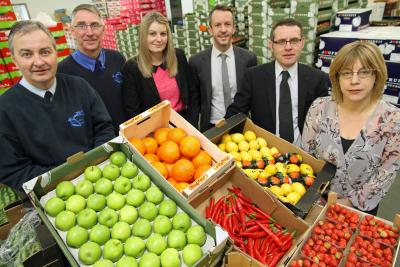Lack of confidence is hindering growth in food and drink sector, says leading accountancy firm

Norfolk’s army of small food and drink producers are being held back from expanding principally by a lack of confidence, according to a report by a specialist food and drink business advisory team.
Lovewell Blake’s Food and Drink Team has found that a lack of faith in their ability to cope with growth is the number one reason why so many of the county’s producers remain relatively small-scale – with four other key factors playing a part as well: financial issues, regulation, scalability, and the lack of a strong brand.
Justin Wright, who heads up the accountants’ Food and Drink Team, is calling for more support for growing businesses in what is a key sector in the local economy.
“Here in East Anglia we have a plethora of artisan food and drink producers – something that we should certainly be celebrating,” said Mr Wright. “But it is noticeable that in many cases, just as these small producers start to get to the stage where they are successful, and in any other sector would be looking to expand, that a plateau occurs.
“Whilst in some cases the owner has set the producer up as a ‘lifestyle business’, and for these businesses, the lack of growth should not necessarily be seen as a setback. But we also commonly see producers who would love to take that next growth step, but somehow don’t seem able to do it. When you ask them what is holding them back, they often can’t articulate the exact problem.
“The biggest barrier of them all is a lack of confidence. Whilst other issues can be overcome with the right advice and the right attitude, if a business does not have the confidence in its ability to get bigger, it probably won’t. This is why support, whether from peers, supply chains or external experts, is so important.”
Lovewell Blake identified four key factors which are the most common to hinder growth:
- Financial: upscaling often requires investment, and for many food and drink producers, who have often sunk their savings into following their passion and setting up their business in the first place, the prospect of negotiating with banks – or even taking on debt at all – is an intimidating one.
- Regulation: in an attempt to encourage start-ups, small-scale production faces remarkably light-touch regulation (although there are many producers who will find that hard to believe, it is in fact true). Once businesses start to produce in more ‘commercial’ quantities, however, FSA standards start to bite, and that means understanding labyrinthine rules, as well as a regime of inspections and monitoring. And meeting those higher standards almost always involves extra cost, whether in equipment, premises, training or simply creating procedures.
- Having the right brand: having the right brand presence and values is a critical part of finding success on the supermarket shelf, for example. Big retailers like their suppliers to be savvy about investing in their brands, and this is a world which is often alien to small-scale producers. Fortunately, an artisanal brand is an increasingly value commodity even in commercial-scale food markets, and provided those brand values are backed up by reality, they can be a real asset.
- Scalability: producers who have created a business based on hand-made, human-scale production might find it difficult to envisage how they would cope with demand running at tens or even hundreds of times their current production. Finding a way of scaling up the process without losing the whole ethos of the product can be a tricky problem.
“Food and drink is such an important part of the local economy, and driving growth in this sector will have a disproportionate positive effect on our region’s prosperity,” said Mr Wright. “That is why supporting our food and drink businesses and instilling a sense of confidence in them is so crucial.”













































